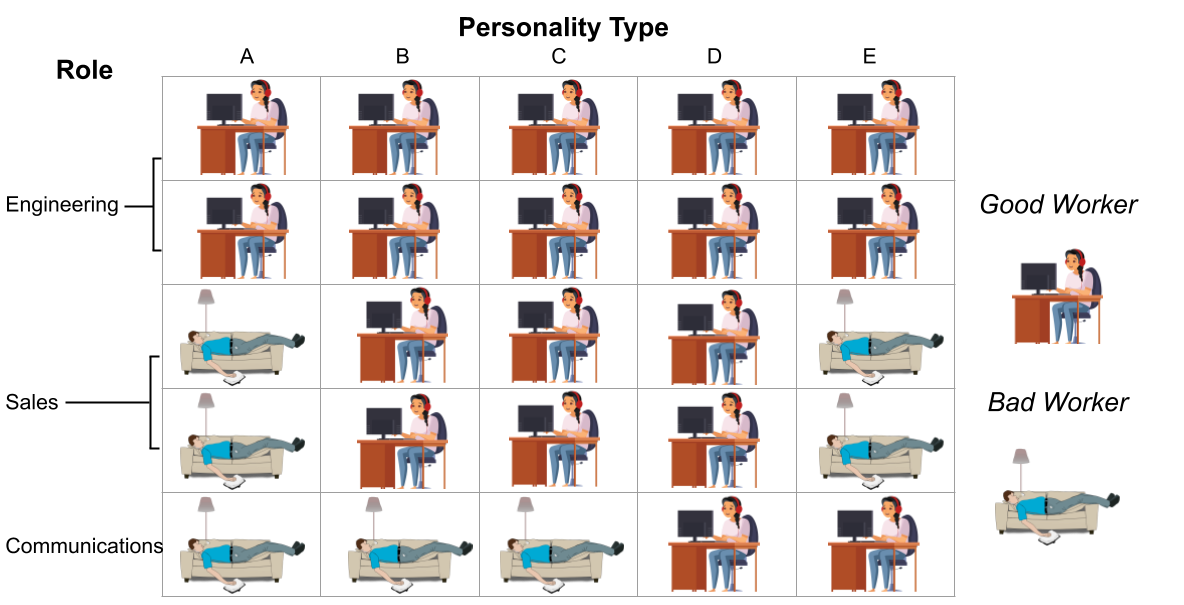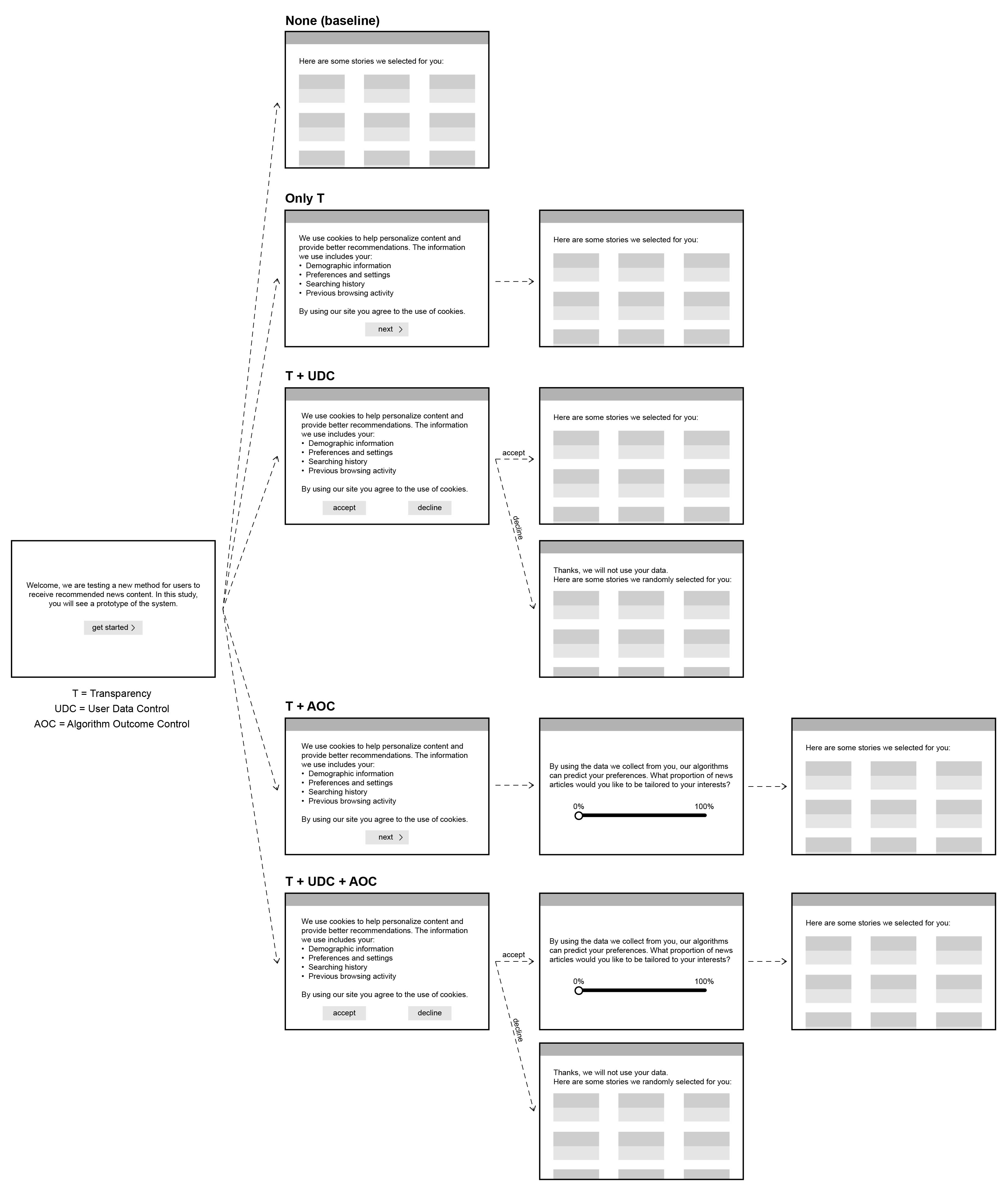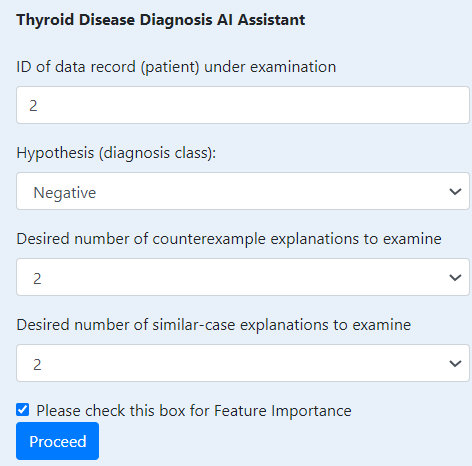Designing Algorithmic Recommendations to Achieve Human-AI Complementarity
2405.01484

0
0

Abstract
Algorithms frequently assist, rather than replace, human decision-makers. However, the design and analysis of algorithms often focus on predicting outcomes and do not explicitly model their effect on human decisions. This discrepancy between the design and role of algorithmic assistants becomes of particular concern in light of empirical evidence that suggests that algorithmic assistants again and again fail to improve human decisions. In this article, we formalize the design of recommendation algorithms that assist human decision-makers without making restrictive ex-ante assumptions about how recommendations affect decisions. We formulate an algorithmic-design problem that leverages the potential-outcomes framework from causal inference to model the effect of recommendations on a human decision-maker's binary treatment choice. Within this model, we introduce a monotonicity assumption that leads to an intuitive classification of human responses to the algorithm. Under this monotonicity assumption, we can express the human's response to algorithmic recommendations in terms of their compliance with the algorithm and the decision they would take if the algorithm sends no recommendation. We showcase the utility of our framework using an online experiment that simulates a hiring task. We argue that our approach explains the relative performance of different recommendation algorithms in the experiment, and can help design solutions that realize human-AI complementarity.
Get summaries of the top AI research delivered straight to your inbox:
Overview
- Explores how to design algorithmic recommendations to achieve complementarity between humans and AI systems
- Proposes a conceptual framework for optimizing human-centric objectives in AI-assisted decision-making
- Highlights the importance of aligning AI recommendations with human preferences and decision-making processes
Plain English Explanation
This paper tackles the challenge of designing AI-powered recommendation systems that can effectively complement and enhance human decision-making, rather than simply replacing or automating it. The key idea is to develop algorithms that can work alongside humans in a synergistic way, leveraging the unique strengths of both to achieve better outcomes.
The researchers propose a conceptual framework for optimizing "human-centric" objectives, which means designing AI systems that prioritize human preferences, values, and decision-making processes. This is in contrast to simply optimizing for narrow metrics or automating tasks without considering the human element.
By aligning AI recommendations with human preferences, the goal is to create a collaborative human-AI partnership where the strengths of both are maximized. For example, an AI-assisted decision-making system could provide relevant data and analysis to support human judgment, while still allowing the human to make the final call based on their own understanding and values.
The key is to move beyond simply optimizing for narrow objectives and instead consider the broader human context and how AI can be designed to complement human decision-making. This requires careful consideration of how humans provide feedback and how AI can negotiate shared agency with humans in the decision-making process.
Technical Explanation
The paper proposes a conceptual framework for designing algorithmic recommendations that can achieve "human-AI complementarity." The key elements of this framework include:
-
Human-Centric Objectives: Rather than optimizing for narrow metrics, the goal is to design AI systems that prioritize human preferences, values, and decision-making processes.
-
Shared Agency: The paper explores how AI and humans can negotiate shared agency in the decision-making process, allowing for a collaborative partnership.
-
Adaptability: The framework emphasizes the need for AI systems to be adaptable and responsive to human feedback and changing preferences over time.
-
Transparency and Explainability: To build trust and enable effective human-AI collaboration, the paper highlights the importance of making AI recommendations transparent and explainable.
-
Holistic Evaluation: The researchers argue for a more holistic approach to evaluating the performance of AI-assisted decision-making systems, going beyond narrow metrics to consider the broader human context and user experience.
Critical Analysis
The paper presents a compelling vision for designing AI systems that can truly complement and enhance human decision-making, rather than simply replacing or automating it. The proposed conceptual framework addresses important considerations, such as aligning AI with human preferences, negotiating shared agency, and ensuring transparency and adaptability.
However, the paper also acknowledges the significant challenges in realizing this vision. Translating these high-level principles into practical, scalable solutions will require extensive research and experimentation. Additionally, the paper does not delve into the specific technical details of how such AI systems would be implemented, leaving room for further exploration.
Furthermore, the paper does not extensively address potential risks or unintended consequences of deploying such AI-assisted decision-making systems at scale. Careful consideration must be given to issues like algorithmic bias, privacy, and the societal implications of empowering AI to play a more prominent role in human decision-making.
Conclusion
This paper presents a valuable conceptual framework for designing algorithmic recommendations that can achieve meaningful human-AI complementarity. By prioritizing human-centric objectives, negotiating shared agency, and ensuring transparency and adaptability, the researchers outline a vision for AI systems that can enhance and support human decision-making, rather than simply replace it.
While significant challenges remain in translating this vision into practical, scalable solutions, the paper highlights the importance of this research direction. Continued exploration and experimentation in this area could lead to AI-powered tools and systems that truly elevate human capabilities and decision-making, rather than undermining them.
This summary was produced with help from an AI and may contain inaccuracies - check out the links to read the original source documents!
Related Papers

Negotiating the Shared Agency between Humans & AI in the Recommender System
Mengke Wu, Weizi Liu, Yanyun Wang, Mike Yao

0
0
Smart recommendation algorithms have revolutionized information dissemination, enhancing efficiency and reshaping content delivery across various domains. However, concerns about user agency have arisen due to the inherent opacity (information asymmetry) and the nature of one-way output (power asymmetry) on algorithms. While both issues have been criticized by scholars via advocating explainable AI (XAI) and human-AI collaborative decision-making (HACD), few research evaluates their integrated effects on users, and few HACD discussions in recommender systems beyond improving and filtering the results. This study proposes an incubating idea as a missing step in HACD that allows users to control the degrees of AI-recommended content. Then, we integrate it with existing XAI to a flow prototype aimed at assessing the enhancement of user agency. We seek to understand how types of agency impact user perception and experience, and bring empirical evidence to refine the guidelines and designs for human-AI interactive systems.
4/23/2024

A Decision Theoretic Framework for Measuring AI Reliance
Ziyang Guo, Yifan Wu, Jason Hartline, Jessica Hullman

0
0
Humans frequently make decisions with the aid of artificially intelligent (AI) systems. A common pattern is for the AI to recommend an action to the human who retains control over the final decision. Researchers have identified ensuring that a human has appropriate reliance on an AI as a critical component of achieving complementary performance. We argue that the current definition of appropriate reliance used in such research lacks formal statistical grounding and can lead to contradictions. We propose a formal definition of reliance, based on statistical decision theory, which separates the concepts of reliance as the probability the decision-maker follows the AI's recommendation from challenges a human may face in differentiating the signals and forming accurate beliefs about the situation. Our definition gives rise to a framework that can be used to guide the design and interpretation of studies on human-AI complementarity and reliance. Using recent AI-advised decision making studies from literature, we demonstrate how our framework can be used to separate the loss due to mis-reliance from the loss due to not accurately differentiating the signals. We evaluate these losses by comparing to a baseline and a benchmark for complementary performance defined by the expected payoff achieved by a rational decision-maker facing the same decision task as the behavioral decision-makers.
5/14/2024

Towards Optimizing Human-Centric Objectives in AI-Assisted Decision-Making With Offline Reinforcement Learning
Zana Buc{c}inca, Siddharth Swaroop, Amanda E. Paluch, Susan A. Murphy, Krzysztof Z. Gajos

0
0
Imagine if AI decision-support tools not only complemented our ability to make accurate decisions, but also improved our skills, boosted collaboration, and elevated the joy we derive from our tasks. Despite the potential to optimize a broad spectrum of such human-centric objectives, the design of current AI tools remains focused on decision accuracy alone. We propose offline reinforcement learning (RL) as a general approach for modeling human-AI decision-making to optimize human-AI interaction for diverse objectives. RL can optimize such objectives by tailoring decision support, providing the right type of assistance to the right person at the right time. We instantiated our approach with two objectives: human-AI accuracy on the decision-making task and human learning about the task and learned decision support policies from previous human-AI interaction data. We compared the optimized policies against several baselines in AI-assisted decision-making. Across two experiments (N=316 and N=964), our results demonstrated that people interacting with policies optimized for accuracy achieve significantly better accuracy -- and even human-AI complementarity -- compared to those interacting with any other type of AI support. Our results further indicated that human learning was more difficult to optimize than accuracy, with participants who interacted with learning-optimized policies showing significant learning improvement only at times. Our research (1) demonstrates offline RL to be a promising approach to model human-AI decision-making, leading to policies that may optimize human-centric objectives and provide novel insights about the AI-assisted decision-making space, and (2) emphasizes the importance of considering human-centric objectives beyond decision accuracy in AI-assisted decision-making, opening up the novel research challenge of optimizing human-AI interaction for such objectives.
4/16/2024

Designing for Complementarity: A Conceptual Framework to Go Beyond the Current Paradigm of Using XAI in Healthcare
Elisa Rubegni, Omran Ayoub, Stefania Maria Rita Rizzo, Marco Barbero, Guenda Bernegger, Francesca Faraci, Francesca Mangili, Emiliano Soldini, Pierpaolo Trimboli, Alessandro Facchini

0
0
The widespread use of Artificial Intelligence-based tools in the healthcare sector raises many ethical and legal problems, one of the main reasons being their black-box nature and therefore the seemingly opacity and inscrutability of their characteristics and decision-making process. Literature extensively discusses how this can lead to phenomena of over-reliance and under-reliance, ultimately limiting the adoption of AI. We addressed these issues by building a theoretical framework based on three concepts: Feature Importance, Counterexample Explanations, and Similar-Case Explanations. Grounded in the literature, the model was deployed within a case study in which, using a participatory design approach, we designed and developed a high-fidelity prototype. Through the co-design and development of the prototype and the underlying model, we advanced the knowledge on how to design AI-based systems for enabling complementarity in the decision-making process in the healthcare domain. Our work aims at contributing to the current discourse on designing AI systems to support clinicians' decision-making processes.
4/9/2024